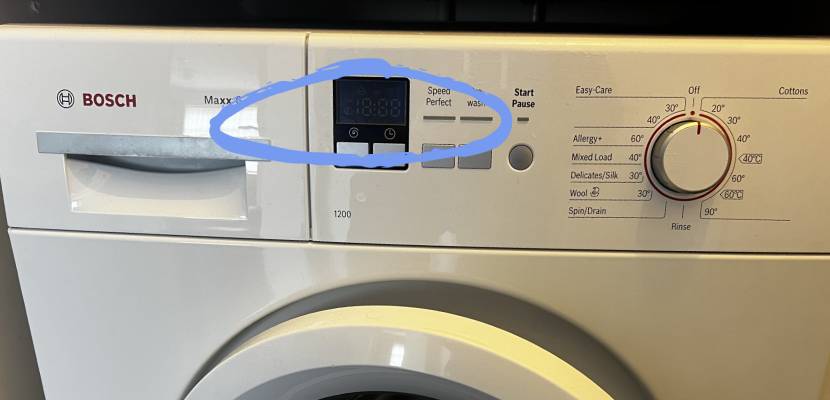
Why Washing Machines Lie About The Time Left
Have you ever impatiently waited for your washing machine to complete its laundry cycle, only to find that your washing machine’s timer played a little trick on you? It claims ten minutes left, but somehow, thirty minutes later, your clothes are still spinning. What gives?
Before you take out your frustration on your machine, take a deep breath and know that it is doing so for a good reason.
An extended wash cycle could happen due to many reasons, and this is mainly because a washing machine estimates a cycle’s duration based on ideal conditions – a perfectly balanced load, a consistent water temperature, and optimal detergent distribution. If this is not the case, then it’s possible for it to need more time to get your clothes cleaned and ready for drying.
Why Your Washing Machine’s Timer May Not Be Accurate
Your washing machine exists to clean your garments thoroughly, and uses advanced technology to predict the duration of a cycle and when your clothes are sparkling clean and ready for drying. However, it is not always spot-on with its estimates.

The machine isn’t intentionally deceiving you, but instead, it’s adapting to the unique circumstances of each load, ensuring your clothes are thoroughly cleaned and ready for the next step – which is drying.
Here are the reasons why your machine may wrongly predict the time it needs to finish a cycle:
The Clothes Are Still Very Wet
Your washing machine doesn’t extend the time left on the cycle without a valid reason. And, the primary culprit behind the inaccurate time prediction is often lingering moisture.
If your machine senses that your clothes are still dripping wet, it extends the spin cycle to wring out the excess water, ensuring your fabrics are ready for the next phase. So, if the timer seems to be playing tricks, blame it on the need for extra spin time.
SEE ALSO: Can You Put Soaking Wet Clothes In The Tumble Dryer?
The Machine Is Overloaded
Overloading your machine is just putting it under unnecessary stress.
An overloaded washer struggles to clean clothes thoroughly, affecting its sensors and overall functionality. The result? An inaccurate estimate of your laundry’s wash time.
Treat your machine with kindness, and it will repay you with accurate timers and sparkling clean clothes. Remember, stick to using 1/2 to 3/4 of your machine’s capacity – a balanced approach that not only speeds up washing but also prolongs the machine’s lifespan.

The Drum Is Unbalanced
Even with modern advancements in washing machine technology, an uneven load can still throw things out of whack.
Loading your machine improperly disrupts its ability to estimate wash and spin cycle times accurately.
Avoid unnecessary stress on your fabrics by evenly distributing the laundry in the drum. A little balance goes a long way in ensuring a smoother, more accurate cycle.
SEE ALSO: Washing Machine Making A Grinding Noise? (try this)
There Is Too Much Detergent
More detergent doesn’t result in cleaner clothes. In fact, it can lead to the opposite!
Excessive detergent can leave residue on your garments, prompting the washing machine to extend the rinse cycle.
Stick to the recommended amount of detergent to avoid unnecessary delays in completing the wash. Your clothes and your washing machine will also last longer in the process.

The Programme Is Not Fit for the Load
Washing machines come with a variety of programmes for a reason. Choosing the wrong one for your load can result in extended cycle times.
Delicate fabrics deserve a delicate programme, just as heavy bedding benefits from a duvet-specific cycle. Select the appropriate programme to ensure your machine works efficiently and effectively.
SEE ALSO: Why Are Washing Machine Cycles So Long? (& how long it should take)
The Filter or Pump Is Dirty
A dirty or clogged filter or pump can impede your washing machine’s efficiency, leading to inaccurate timers.
Regularly clean these essential parts following the manufacturer’s guidelines to keep your machine running smoothly. A little maintenance goes a long way in preserving the accuracy of your washing machine’s timers!

Patience Is A Virtue – Even When Doing Your Laundry
Your washing machine’s occasional “lies” about the time left are rooted in its commitment to delivering perfectly clean, moisture-free clothes.
Understanding the reasons behind these time discrepancies empowers you to optimise your laundry routine, ensuring your washing machine performs at its best.
So, the next time your machine requests a few extra minutes, use the time to do your other tasks and allow your appliance to deliver the best results it can give you!
Frequently Asked Questions
Your washing machine timer may be inaccurate due to factors like lingering moisture in clothes, overloading, unbalanced loads, excessive detergent, program mismatches, or dirty filters and pumps that’s affecting its ability to estimate cycle times accurately.
The normal time for a washing machine cycle varies, but it typically ranges from 30 minutes to over an hour, depending on factors like the selected program, load size, and machine efficiency.
The shortest cycle on a washing machine is usually the quick wash or express wash cycle, which typically lasts around 15 to 30 minutes, designed for lightly soiled loads.
Detergent residue on clothes after washing may occur due to using too much detergent. Excessive detergent can prompt the washing machine to extend the rinse cycle. Stick to the recommended amount to avoid this issue.
To deep clean a washing machine, run an empty cycle with hot water and vinegar or a specialised washing machine cleaner. Additionally, regularly clean the filter and pump following the manufacturer’s guidelines to maintain efficiency and accuracy in cycle times.
Also, follow us on Pinterest ...



